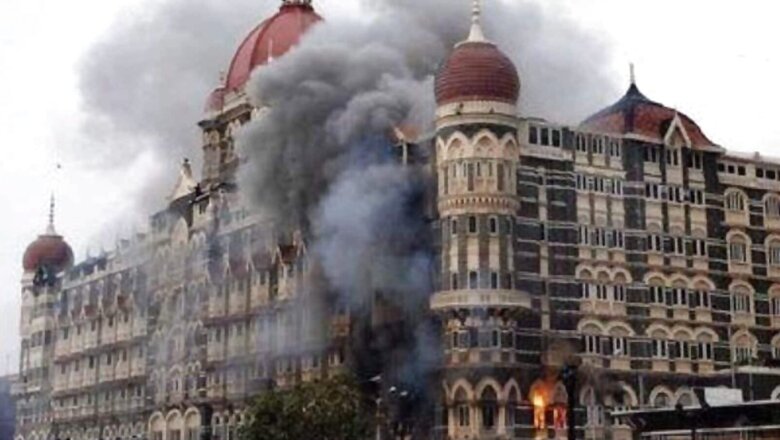
views
This write-up must compulsorily commence with a homage to those who suffered the effects of the terror-related acts in Mumbai on November 26, 2008. While India as a nation suffered trauma, families of 166 fatal casualties were torn apart, forever. However, it was heartening to see the resilience of the proud city of Mumbai which has over the years been impacted several times by actions of terrorists because of its iconic status as the financial capital of India. Targeting Mumbai means targeting India’s growth potential and attempting to prevent the inflow of foreign capital into India due to the inability of the State to stabilise conditions for normal economic activity.
One of the major achievements India never boasts about is that in 13 years since 26/11, it has remained relatively free of big-ticket terror attacks. For a nation with such diversity and a neighbourhood mostly on security tenterhooks, this is a fair achievement for India’s intelligence agencies. We need to discount the events in Jammu and Kashmir and those related to it, such as the Pathankot attack in 2016. India’s maturity as a nation is reflected by its awareness that it exists in difficult times. The threat from global terror is hardly over. In fact, as the world resets post pandemic and the altered dynamics emerge from the events in Afghanistan, there is every likelihood of a surge in extremism in various regional core centres.
Another major terror-related event in India would give an impetus to global radical jihadists and boost the confidence of Pakistan’s deep state which masterminded 26/11 and other major acts. Nothing has changed in 13 years as far as Pakistan’s attitude and aim are concerned; targeting India through a series of calibrated attacks of different nature. It continues to live in denial. The international community informally recognizes this but needs to do much more to dissuade Pakistan from pursuing this line.
Lessons from 26/11
The lesson from geopolitics should be clear. India is not likely to see an environment of peace in its neighbourhood. It will also remain the target of various powers and entities who wish to see it fail. Its large coastline and extensive borders make it extremely challenging to secure it from external elements but equally there is every scope of internal dissension which will bring proxies forward to act on behalf of various external sponsors.
Geopolitics is the last vista that India can hope will be helpful towards its security. In fact, this is likely to only worsen as 5th Generation Warfare (5GW) starts to take shape even before 4th Generation Warfare (4GW) has ended. 4GW alludes to the employment of non-state actors or state-sponsored non-state actors, as was done during 26/11. 5GW involves use of non-kinetic means and, in particular, psychological warfare which hugely supports the capability for 4GW. Cultivation of local support for 4GW has been enabled by modern 5GW. We have to develop more means to counter the progression of 5GW in India by external elements and proxies.
Have we learnt the lessons from 26/11 to be in a reasonable state of confidence to first prevent a big terrorist-related event and second even if perpetrated, limit its damage? Many lessons emerged from 26/11 but it would be highly unprofessional to see them in isolation. The event had a cascading effect on the world of terror and counter-terror and the terrorists themselves learnt many lessons which they are progressively applying universally. India must therefore keep 26/11 as a base event and build scenarios contextual to those acts but with more modern resources.
The first and immediate set of lessons were implemented in quick time. These included the setting up of hubs of National Security Guard (NSG) in all metros to cut down time for response in the event of an incident. We may recall how the NSG was stuck in traffic jams between Manesar and Gurgaon on the night of 26/11. The Army’s local formations were tasked to train their Ghatak Platoons for urban terror contingencies to enable immediate response before the NSG arrived. These directives, of course, need better follow up because complacency is always possible.
The local police units are better armed today and have anti-terror squads and QRTs (quick response teams). However, any amount of training for response will be too little. Response of a security organisation is as good as its last training. What is not perhaps on the training radar for most of the forces is scenario-building and preventive actions. It is good to train on realistic scenarios and include all stakeholders in that. Remember terrorists are big ‘copy cats’ and they like to outdo each other by repeating actions. For example, I would always anticipate Pakistan-sponsored proxies targeting soft elements in border states like Punjab where it is not possible to secure all potential targets; this is exactly the way Pakistani terrorists targeted their own nation. There are cantonments in the vicinity of the border which can be accessed in one night’s infiltration effort and attacked.
How to up Our Game
While we have travelled many miles from 26/11 in terms of security yet in the spirit of making India fully secure, all institutions such as garrisons, government offices, schools, colleges, hospitals and even manufacturing facilities must have an alarm system and a procedure for emergent security contingencies. All states, ministries and institutions are, for example, supposed to prepare disaster management plans as mandated under the Disaster Management Act of December 2005. On similar lines, security plans to secure organisations against physical targeting by terrorists must be prepared. This will enhance security awareness but only if exercises are conducted on these plans. There are enough professionals in India who can help prepare these plans.
The question most people ask is why was Mumbai chosen for the terror strike? Besides the stock answer that Mumbai is India’s financial capital and thus the core centre linked and associated with India’s growth, it is important to remember that India’s adversaries do not wish to see it grow into a confident and resilient nation. Psychologically, they wish to prove that such important cities, institutions or other entities can be successfully targeted at will. Mumbai is resilient as a city. Tomorrow, some other city could break down under the pressure with undefinable consequences.
ALSO READ | This is How India Can Counter Pakistan’s Dangerous Revival Game in Kashmir
If under pandemic conditions an act like this were to occur, it would be more turbulent and catastrophic. Therefore, it is not a question of lessons learnt from Mumbai 26/11 alone but application of mind to scenarios which could emerge on the basis of modern technologies, geopolitics and local conditions. Our intelligence agencies are outstanding but it would be unfair to expect hundred per cent effectiveness in terms of early warning. What is also needed is a strong response system and community awareness which when merged effectively acts as a winner. The idea is to limit damage even if we have failed to prevent a terror act.
Lastly, Pakistan must be mindful of the fact that there is a threshold for tolerance. It’s been crossed with consequences before. There should remain no doubt that if crossed again, the response may stretch to something which may set Pakistan back many years, nukes or no nukes.
The writer is a former GOC of the Srinagar-based 15 Corps and Chancellor Central University of Kashmir. The views expressed in this article are those of the author and do not represent the stand of this publication.
Read all the Latest Opinions here



















Comments
0 comment